|
|
|
Sort Order |
|
|
|
Items / Page
|
|
|
|
|
|
|
| Srl | Item |
| 1 |
ID:
046758


|
|
|
|
|
| Publication |
Westport, Praeger, 2002.
|
| Description |
xxviii, 219p.
|
| Standard Number |
0275972860
|
|
|
|
|
|
|
|
|
|
|
|
Copies: C:1/I:0,R:0,Q:0
Circulation
| Accession# | Call# | Current Location | Status | Policy | Location |
| 045565 | 355.033544/RYN 045565 | Main | On Shelf | General | |
|
|
|
|
| 2 |
ID:
119438
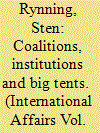

|
|
|
|
|
| Publication |
2013.
|
| Summary/Abstract |
Armed interventions of the past decades demonstrate that strategic leadership can give way to lofty campaign plans, conflicting strategic narratives and concern with tactical, as opposed to strategic, issues. The intervention debate rightfully emphasizes the need for both leadership and institution-building to rectify this situation, but then breaks down into discord: some critics argue that stronger leadership by big nations is necessary, others that this type of leadership wrecks the collective institutions that are needed in a new age of multilateralism and interdependence.
This article argues instead that strategic leadership grows out of the effort to connect the three distinct political arenas that have come to dominate armed interventions: coalitions, institutions and big tent diplomacy. Strategic leadership is not about choosing between coalitions or institutions; it is about building bridges among these political arenas.
The article embeds this argument within the strategic literature and demonstrates how it emerges from an engagement with modern armed interventions. It engages in two in-depth assessments of NATO's experiences in Afghanistan and Libya and then undertakes a more general discussion of the steps that can be taken to encourage strategic leadership.
|
|
|
|
|
|
|
|
|
|
|
|
|
|
|
|
| 3 |
ID:
153842


|
|
|
|
|
| Summary/Abstract |
The Harmel review of 1966–7 is a story of how NATO collectively attempted to define a political role for itself; how France resisted; and how Germany was of two minds and hoped to resolve tensions by bridge-building. Much has changed since then—Britain is exiting the EU; Russia is an assertive but lesser power; the United States intends to pivot to Asia—but this underlying pattern remains. The cause hereof is a durable divide in French and German thinking on ‘political NATO’, meaning NATO as a framework for the coordination of key national security policies, as well as a framework that Europe's political organization cannot take place in opposition to. Political NATO was the foundation of the Harmel Report, and this certain idea of NATO continues to bedevil the Franco-German attempt to build Europe and refashion transatlantic relations. We should only take this effort seriously to the extent that the two countries have overcome their divide on political NATO. This article therefore explores the history and contemporary significance of French and German policy on political NATO and in particular three issues that dominated the Harmel Report: Europe's relationship with the wider Atlantic community, Russia's position in Europe's security order, and NATO's global engagement. While France and Germany have managed a certain rapprochement, the article concludes, their divide on political NATO continues to be of continental consequence.
|
|
|
|
|
|
|
|
|
|
|
|
|
|
|
|
| 4 |
ID:
138948
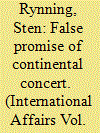

|
|
|
|
|
| Summary/Abstract |
The war in Ukraine is revelatory of a malaise in Europe's security order created by Russia's resistance to western institutions on the one hand and the western desire to maintain these institutions while partnering with Russia on the other. Absent a sense of priorities, western policy risks contributing to the erosion of Europe's security order that Russia seeks in opposition to western ambition. Europe's order is premised first and foremost on a distinctively western concert of nations—whereby Euro-Atlantic states coordinate policy according to a common purpose layered into both NATO and the EU—that forms part of a wider balance of power between Russia and the West. Western policy should aim to strengthen the concert and clarify the balance. However, the prevalent desire to include Russia in the concert confuses matters in a major way, eroding both the underlying sense of priorities and the foundation for order. This article examines this threatening erosion and traces it to three underlying trends: political contestation with regard to the meaning of ‘restoration’ post-1989; military instability following from the unpredictability of ‘hybrid war’; and moral equivocation on the part of the West when it comes to defending the Euro-Atlantic security order. The article concludes that given the depth of contestation, western allies should learn to distinguish concert from balance and act on the condition that the former, a vibrant western concert, is a precondition for the latter, a manageable continental balance.
|
|
|
|
|
|
|
|
|
|
|
|
|
|
|
|
| 5 |
ID:
135872


|
|
|
|
|
| Summary/Abstract |
This article examines NATO's transformation from the Cold War to the present and offers a framework of interpretation. Transformation has entailed a downgrading of territorial defence and an upgrading of out-of-area crisis management, as well as diplomatic engagement and partnership. NATO has thus become a more diversified and globalized alliance. The article traces the evolution post-1989 of the principled policy areas for the alliance—defence, crisis management and partnership—and explains difficulties of development within each area. It also enters into the controversy of interpreting NATO. It explains NATO as an outcome of America's enduring need to engage in the management of Eurasia's rim and Europe's equally enduring need for outside assistance in organizing a concert of power inside Europe. NATO has historically been strong when Europe's and North America's power capabilities and concepts of order are in equilibrium and thus when NATO governments have defined the geography of the Atlantic peace in such a way that both pillars can contribute to it in substantial ways. The article puts this perspective in opposition to two mainstream frameworks of thinking—liberal idealism and retrenchment realism—and applies it in a critique of the diversified and globalized profile that the alliance has developed. The article finally offers a moderately positive assessment of NATO's September 2014 Wales summit as a contribution to renewed geopolitical equilibrium, and it suggests how this contribution could be further strengthened.
|
|
|
|
|
|
|
|
|
|
|
|
|
|
|
|
| 6 |
ID:
170463


|
|
|
|
|
| Summary/Abstract |
NATO’s crisis management engagement came of age in the Kosovo crisis of 1999, as the alliance committed fully to this role in its 1999 Strategic Concept and consequently inscribed the engagement in the Euro-Atlantic security architecture it sought to refine in subsequent years. The war in Afghanistan brought change as NATO at first sought to implement its crisis management principles and then, when it ran into policy failure, accepted the Americanization of its strategy and ultimately sought to reformulate its principles in more modest terms. Where Kosovo lessons were initially seen in European security management terms, their subsequent limitations on the wider global stage impacted NATO’s broader transformation for twenty-first-century security and defense operations. NATO is today still coming to terms with the experience.
|
|
|
|
|
|
|
|
|
|
|
|
|
|
|
|
| 7 |
ID:
156090
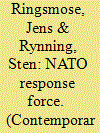

|
|
|
|
|
| Summary/Abstract |
This article reviews the gloomy saga of the EU Battlegroups, focusing on four questions: Where do they come from? What do they look like? What have they been hindered by? And where do they go from here? It builds upon earlier findings in the literature and adds novel insights based on original data. In doing so, the article pays particular attention to the standby nations’ constant calculation of political and financial costs. It argues that recognizing these cost–benefit calculations allows for identifying the most crucial areas to be tackled to make the EU Battlegroups functional. In addition, the article stresses that these considerations play out in a setting wherein the Battlegroups are just one among many policy instruments available for rapid response.
|
|
|
|
|
|
|
|
|
|
|
|
|
|
|
|
| 8 |
ID:
181192
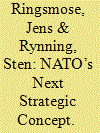

|
|
|
|
|
| Summary/Abstract |
NATO has embarked on the renewal of its Strategic Concept, the latest version of which dates to 2010. The question is whether this opportunity for renewal will result in a broad and elastic set of core tasks that have wide political appeal but that are ill suited to meet NATO’s strategic challenges. The Alliance opted for political convenience in 2010, and since then the complexity of Alliance politics has only increased. Allowing political considerations to dictate the contents of the new Strategic Concept would, however, bode ill for NATO’s ability to manage not only great-power competition but also an internal political–military divide that has become increasingly visible as NATO has adapted to Russia’s post-2014 revisionism. NATO’s next Strategic Concept should therefore put collective defence at the top of its list of priorities, reinvigorate NATO’s narrative of values, and encourage enhanced and sustained in-house political–military dialogue.
|
|
|
|
|
|
|
|
|
|
|
|
|
|
|
|
| 9 |
ID:
187211
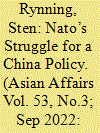

|
|
|
|
|
| Summary/Abstract |
NATO has promised to address China as “an alliance” but struggles to define underpinning principles. This article explores NATO's policy options and prospects. It traces the evolution of NATO China policy from 2017 on; assesses NATO's ability to pull China under its resiliency policy regime; and evaluates NATO's capacity to address wider issues of global order. The article concludes that NATO is not able to develop a politico-military strategy in line with classical alliance policy. Instead, NATO has pursued an incremental alignment policy to nourish its internal consensus and stave off the dire prospect of leadership abdication. Pushed by China's implicit support for the war in Ukraine, NATO must now become more politically explicit about China, global order, and NATO's approach to it.
|
|
|
|
|
|
|
|
|
|
|
|
|
|
|
|
| 10 |
ID:
099704


|
|
|
|
|
| Publication |
2010.
|
| Summary/Abstract |
The North Atlantic Treaty Organization (NATO) has since the turn of the new century experienced a double transformation gap: between global and regionally oriented allies and between allies emulating new military practices defined by the United States and allies resisting radical change. This article takes stock of these gaps in light of a decade's worth of collective and national adjustments and in light of counter-insurgency lessons provided by Afghanistan. It argues first of all that the latter transatlantic gap is receding in importance because the United States has adjusted its transformation approach and because some European allies have significantly invested in technological, doctrinal, and organizational reform. The other transformation gap is deepening, however, pitching battle-hardened and expeditionary allies against allies focused on regional tasks of stabilization and deterrence. There is a definite potential for broad transformation, our survey of officers' opinion shows, but NATO's official approach to transformation, being broad and vague, provides neither political nor military guidance. If NATO is to move forward and bridge the gap, it must clarify the lessons of Afghanistan and embed them in its new Strategic Concept.
|
|
|
|
|
|
|
|
|
|
|
|
|
|
|
|
| 11 |
ID:
153362
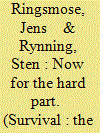

|
|
|
|
|
| Summary/Abstract |
NATO’s July 2016 Warsaw Summit was a crowning achievement in terms of Alliance adaptation. Taking place on the territory of a former Soviet vassal state (Poland), the summit consecrated the Alliance’s embrace of a renewed strategy of deterrence by punishment vis-à-vis Russia. The punishing intent, reminiscent of the Cold War, is made clear in the section of the summit’s declaration on nuclear policy, in which the allies state that
|
|
|
|
|
|
|
|
|
|
|
|
|
|
|
|
| 12 |
ID:
080521


|
|
|
|
|
| Publication |
2007.
|
| Summary/Abstract |
The European Union has since 2003 developed both a security and a Weapons of Mass Destruction strategy, and it has become the primary interlocutor of Iran in the dispute related to Iran's nuclear development. These are signs of significant policy progress. However, the fact that four years of nuclear diplomacy have brought few results invites a critical appraisal of EU strategy. This essay undertakes this appraisal, arguing that the EU is notably ambivalent regarding its underlying conception of international order. The EU wishes to be pluralist (in the tradition of sovereign equality), but is also anti-pluralist (in the liberal-democratic tradition). The essay lays out how the EU has coped with pressures for reform - arising notably from the United States - within the current international nuclear non-proliferation regime, and how this has made the EU problem apparent. The essay finally suggests that to salvage its policy of effective multilateralism the EU must acknowledge its anti-pluralist bias and promote a common transatlantic approach to nuclear non-proliferation
|
|
|
|
|
|
|
|
|
|
|
|
|
|
|
|
| 13 |
ID:
177886


|
|
|
|
|
| Summary/Abstract |
As the United States and the world begins to adjust to a Biden presidency, the North Atlantic Treaty Organization (NATO) once again finds itself at a crossroads. Diplomats and transatlantic supporters on both sides of the Atlantic collectively expelled a sigh of relief last November that a second Trump term—which many feared might spell the end of the 72-year-old alliance—had not come to pass. However, the mood is far from celebratory in either Washington or European capitals because all parties understand that, to steer clear of irrelevancy and remain “fit for purpose,” NATO needs renewal—the question is how?
|
|
|
|
|
|
|
|
|
|
|
|
|
|
|
|
| 14 |
ID:
108777


|
|
|
| 15 |
ID:
086293
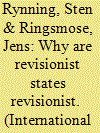

|
|
|
|
|
| Publication |
2008.
|
| Summary/Abstract |
In this article, we argue that Realism recently has eschewed big and important questions of war and peace and that revived Classical Realism can help bring Realism back on track. Modern Realists tend to assume that states are either all status quo players or all revisionists, and the result is a slippery grasp of the sources and dynamics of international change. To revive Classical Realism, we examine three dominant sets of criticism. We notably return to the classical texts of Realism to show that the classics were in fact not reductionist: they did not reduce either systemic or national phenomena (third and second image theory) to human nature (first image). Classical Realists understood the many intricate and delicate connections between these levels, and it is modern era Realists who are reductionists because they reduce explanations to systemic phenomena. We show how Classical Realism can respond in strength to its critics and ask the kind of research questions that again will advance our understanding of international change.
|
|
|
|
|
|
|
|
|
|
|
|
|
|
|
|
|
|
|
|
|